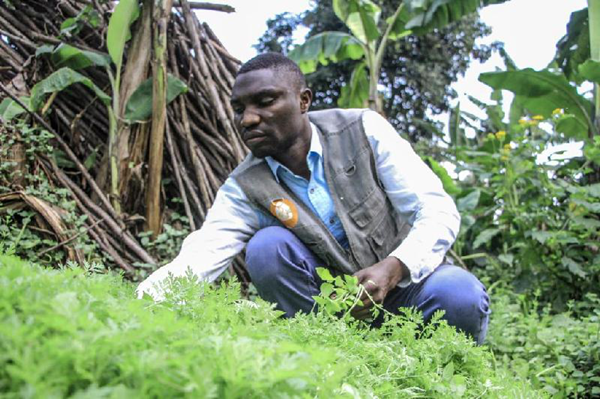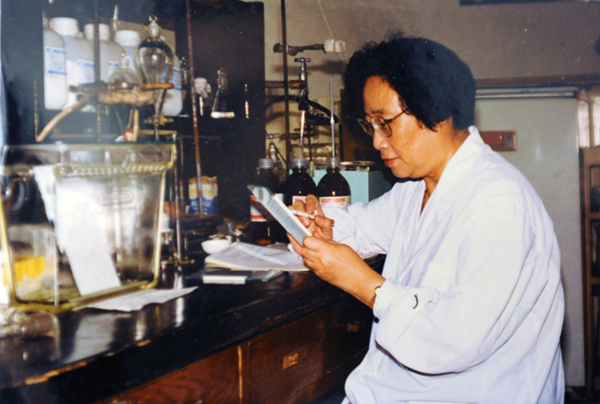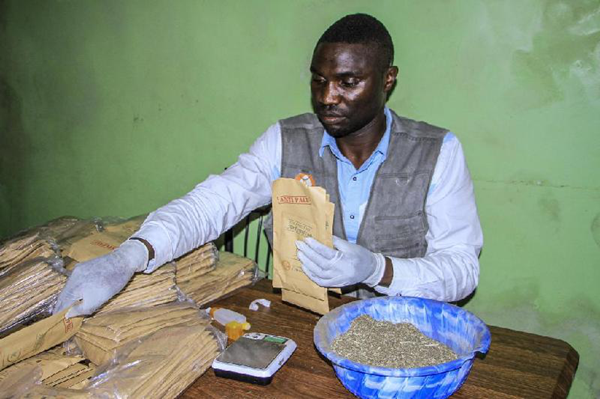China's experiences in fighting malaria inspiring, says 'Dr Artemisia' from DR Congo
Editor's note: World Malaria Day is celebrated on April 25. China successfully extracted artemisinin from artemisia annua and developed it into a medicine in the 1970s. Since then the medicine has been popular in Africa and has saved millions of lives. In the central African country of the Democratic Republic of the Congo (DRC) lives "Dr. Artemisia", who specializes in the plant's cultivation.

Kaloma observes the growth of artemisia annua in the outskirts of Goma, North-Kivu province of the Democratic Republic of Congo. [Photo/Xinhua]
Artemisia annua is growing thickly in a plantation in North-Kivu province of Northeast DRC.
The province was hard hit by malaria, and many people have died from the disease, making it a nightmare for locals.
In order to change this situation, Patient Kaloma has dedicated himself to artemisia annua plantation in his hometown since he graduated from university in 2017. Locals call him "Dr Artemisia" affectionately.
"The DRC is wet and rainy, and malaria is rampant here. Growing artemisia annua is our only way out," Kaloma talked about his initial intention of devoting himself to artemisia annua cultivation and research.
During the interview, he patiently explained every detail of the plantation. Despite his usual quiet manner, Kaloma becomes chatty in seconds, when it comes to artemisia annua.
According to the latest data from the World Health Organization (WHO), there were about 241 million malaria cases and 627,000 deaths worldwide in 2020, over 90 percent of which occurred in Africa. Children under 5 years of age accounted for 80 percent of all malaria deaths in Africa, while the DRC made up 13.2 percent of global malaria deaths.
"We generally use a folk remedy to cure malaria," Kaloma said. "After harvesting artemisia annua, we grind it into powder and let the patients take it with warm water for a week, then most of them would get better. This is the reason why I spare no effort to promote artemisia annua cultivation and research."
In addition to the folk remedy, artemisinin medicines, which have fast-acting effects, slight side effects and low prices, are the best-seller in Kaloma's hometown. "Compared to the folk remedy, artemisinin medicine has better effectiveness, and locals are inclined to use it," said Mwamba, a pharmacist in Goma, the capital of North-Kivu.
From China's success in extracting artemisinin and developing it into a medicine in 1972, to Chinese scientist Tu Youyou being awarded the Nobel Prize in Physiology or Medicine in 2015 for it, as well as China receiving the WHO certification of malaria elimination in 2021, China's path to the fight against malaria has always inspired his cause and belief in artemisia annua, said Kaloma.

Tu Youyou at work [Photo/Xinhua]
"Artemisinin plays an important role in China's fight against malaria, and China provides us with a viable model," Kaloma said, admitting that he has faced many difficulties in growing artemisia annua and once tended to give up, but China's successful experiences in fighting malaria restored his confidence again and again.
Thanks to Kaloma's tireless efforts, more and more young people in North-Kivu are now joining artemisia annua cultivation, with some of them displaced by the armed conflict in the northeastern region of the DRC.
Artemisia annua has also become an important local cash crop for its unique medicinal value.

Kaloma packs artemisia annua leaves that have been dried and crushed into powder in the outskirts of Goma, North-Kivu province of the Democratic Republic of the Congo. [Photo/Xinhua]
"I strongly believe that the artemisia annua cultivation industry can become a new opportunity for young people in North-Kivu," Kaloma said.

Follow us on WeChat
京ICP备18041594号-1
京公网安备 11010202005508号

Follow us on WeChat


